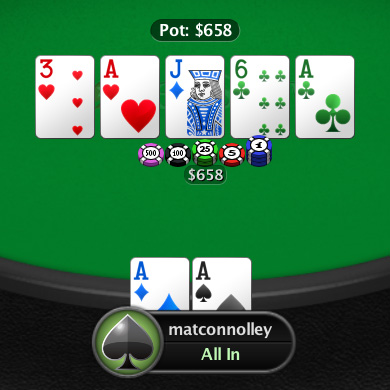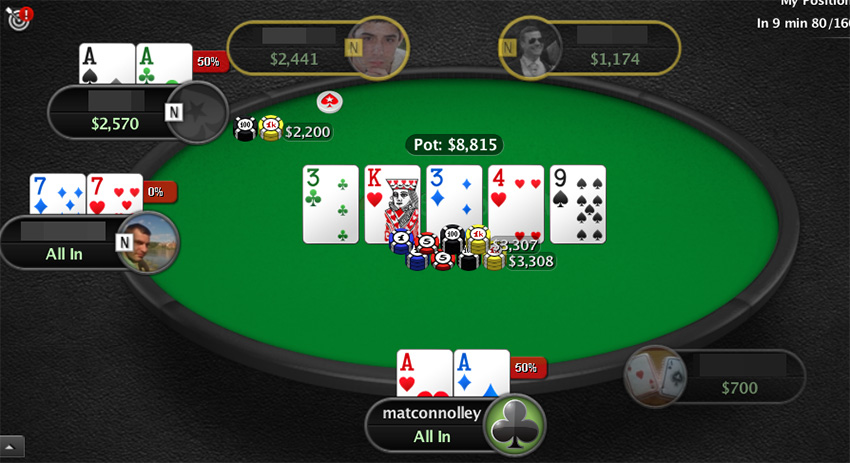How do casinos make money?
 I've been obsessed with poker for about five months now. I've just this week completed my goal of turning an initial £10 stake into £100! There were two things that originally got me interested in it.
I've been obsessed with poker for about five months now. I've just this week completed my goal of turning an initial £10 stake into £100! There were two things that originally got me interested in it.
Firstly, unlike many other gambling games, it involves a degree of skill. I thought that if I learned the maths and probability behind it, maybe I could do well.
Secondly, playing it in a casino doesn't involve playing against the house. And as we all know, the house always wins. For example Blackjack and Roulette incorporate rules specifically designed to give the casino an edge of the players, and slot machines have a fixed percentage that they return over time.
I didn't really understand how it all worked, so I've done some reading and here's what I've learned. It turns out I was wrong!
Blackjack
The house edge in Blackjack comes mostly from the rule that if the player busts then they lose - it doesn't matter if the dealers subsequently busts too. This happens often enough to make a bit of money for the casino every time it does.
This means that even a good Blackjack player will lose on average 1% of the their stake over time, but 1% is pretty good compared to some other casino games.
Roulette

Using European Roulette as an example, there are 37 pockets that the ball can fall into. If you put £1 bets on all 37 numbers you'd be guaranteed to win £35 every time the ball rolled, losing you £2 per go. The house edge here is 2.7%.
Or let's say you place £1 on black and £1 on red, so you'll win £2 back most of the time. But every 1 in 37 times (on average) the ball will fall into the 0, so over time you're losing 2.7p each time the ball rolls. The house edge is still 2.7%.
American Roulette has a 0 and a 00 pocket, which increases their edge to 5.3%.
To be honest I don't know why anyone ever plays Roulette, but many people over the years have told me about a mathematically proven system that beats the house.
The Martingale System
The idea is simple - you place a bet on red (or black if you prefer) and each time you lose, you double your stake. This is formally named the Martingale System.
As an example:
- I bet £1 on red
- If red comes up, I've won £1
- If red doesn't come up, I bet £2 on red next time
- If red comes up, I've won £1 (£4 in winnings minus £3 in stake)
- If red doesn't come up, I bet £4 on red next time
- If red comes up, I've won £1 (£8 in winnings minus £7 in stake)
- If red doesn't come up, I bet £8 on red next time
- If red comes up, I've won £1 (£16 in winnings minus £15 in stake)
- and so on...
Eventually I'm bound to win, because red has to come up at least once!
The first reason this doesn't work is that no matter how much you bet, you only win back your original stake. So you'll need to make your original stake really large.
Say we started off with a £1,000 bet on red, eventually we're going to win back £1,000 when red comes up, even if it takes ten spins. But if it takes ten spins, then by spin ten we're betting £512,000 just to win £1,000! If you've got half a million quid lying around, are you really going to risk all of it to win a grand? And what happens if it takes twenty spins? Pretty unlikely, but you'll need just over £1bn in case it happens.
The second reason this doesn't work is because of the 0. One time in 37 (on average) the little ball is going to fall into the zero pocket and you've got to start all over again. It's pretty unlikely to happen once (2.7% likely in fact), but in our ten-spin example it's not looking good for you.
Slot machines
 This, I discovered, is where the really big money comes from. Slot machines are programmed to return a fixed percentage back to gamblers over time.
This, I discovered, is where the really big money comes from. Slot machines are programmed to return a fixed percentage back to gamblers over time.
This is typically around 80-90%, but that's over millions of spins, and you're not guaranteed to get anything like that back.
In this example photo that I snapped in a pub the other day, it's 74%. Those are pretty terrible odds.
Taking Nevada in 2009 as an example, poker brings in around 1.6% of the total gaming revenue for the state.
Compare this with 4.7% for Roulette, 13% for Blackjack, and a whopping 51% for slot machines!
So let's avoid those too.
Rake
So I started playing poker online, thinking that I was being clever by not having the compete against the house. But pretty quickly I started to wonder how websites like Pokerstars was making money out of all this. And that's when I discovered rake.
Rake is the commission taken by a poker room (real or online) from a game. It ranges from 2.5% to 5% depending on where you play, and is usually expressed in a tournament buy-in as £X + Y where X goes into the prize fund and Y is the rake that the poker room take for organising the tournament.
For example, I entered a 6-handed tournament on Pokerstars last week that was advertised as a $1.50 buy-in (I know, big spender!) which the details listed as $1.40 + $0.10 entry fee, with a prize pool of $8.40. So Pokerstars are making $0.60 each time one of these tournaments start.
To give you an idea of how much money they're making out of this, they recently celebrated their 100 billionth hand, and most of their tournaments cost more than $0.50 to enter. Last year Pokerstars was sold for $4.9 billion in cash.
It turns out that rake is the major factor stopping the average player from winning money at poker. One poker forum post said "rake isn't the most important thing, it's the only thing".
Although it looks like they're giving you free drinks and food, in a live casino you're actually paying something like $15 an hour to play.
Of course you are, and I can't believe I ever thought differently.
Learning this has really changed my opinion of poker - I'd much rather play a home game with some friends, because I know that no-one's taking my money apart from my mates!

Comments
Recent posts
Five things I'm going to miss about Cornwall

In ten days we're leaving the UK for new adventures in Spain...
Read moreOwning less stuff

We're off to Spain for new adventures in a couple of weeks, and we've spent the last three months sorting our possessions into the four S's: ship, store, sell or skip...
Read moreArchive
2016December 2016 (2)November 2016 (2)October 2016 (2)September 2016 (3)August 2016 (4)July 2016 (5)June 2016 (4)May 2016 (4)April 2016 (5)March 2016 (4)February 2016 (4)January 2016 (5)2015December 2015 (4)November 2015 (4)October 2015 (5)September 2015 (4)August 2015 (4)July 2015 (4)June 2015 (4)May 2015 (5)April 2015 (4)March 2015 (4)February 2015 (4)January 2015 (4)What's this about?

Hi I'm Mat and I'm addicted to new hobbies. I used to think this was a bad thing but now I'm embracing it.
Writing them all up in this blog encourages me to finish projects, and helps me keep track of which ones I've tried.
Classified adverts

Today I'm starting a new game to see who get the silliest classified advert printed in their local paper...
Also in Inside my brain...
Mobile-free Monday

I often find myself compulsively checking my phone...
